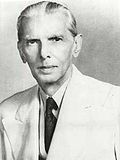 | |
| Established | 1985 |
|---|---|
| Location | Mazar-e-Quaid, Karachi, Pakistan |
| Type | History museum |
| ||
|---|---|---|
Governor-General of Pakistan ContentsPolitical views Properties Gallery: Picture, Sound, Video | ||
Aiwan-e-Nawadrat-e-Quaid-i-Azam (ANQA), also known as Aiwan-e-Nawadrat Museum is situated within the boundaries of Mazar-e-Quaid in Karachi, Pakistan. [1] This museum holds a remarkable collection of historical items and showcases objects connected to the nation's founder, Muhammad Ali Jinnah. [2]

